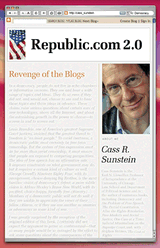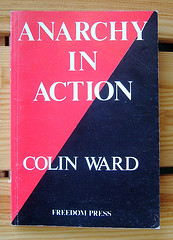24 September 02008
Why the net won't turn us all into social isolationists
 Last year Cass Sunstein produced a revised version of his book Republic.com, titled — with crushing inevitability — Republic.com 2.0
Last year Cass Sunstein produced a revised version of his book Republic.com, titled — with crushing inevitability — Republic.com 2.0. In it, he critiqued the impact of the net on democratic discourse and public spaces. His dystopia is one where we all subscribe to the Daily Me, a filter that presents us only with the worldview of people we agree with. What we gain in (temporary) contentedness we lose in critical appraisal and debate — with potentially dire political and social consequences.
I think there are three sets of reasons why Sunstein's dystopia will not come about:
- Filtering and recommender systems will always be imperfect; they'll never be as good as their evangelists would have you believe.
- Even if perfect filtering did work, people wouldn't like it; they'd quickly get 'perfect' fatigue.
- If people did liked perfect filtering, we wouldn't need the blogs that Sunstein argues are the medium of 'echo chamber' opinion: if all you ever have to say is 'me too' in chorus with your like-minded peers, the whole point of blogging (self-casting) disappears.
After my book was reviewed alongside Republic.com 2.0, James Harkin at the ICA invited me to give a response to Professor Sunstein when he was due to speak there last December. Unfortunately Sunstein had to cancel his trip to the UK, and, since he's published several more books since then, the chances of me delivering my response in person are low. So here it is in writing instead.
Continue reading "Why the net won't turn us all into social isolationists"13 July 02007
Is Web 2.0 a manifesto for anarchism?
 Here are some chapter headings from a book I read on holiday:
Here are some chapter headings from a book I read on holiday:
The Theory of Spontaneous Order
The Dissolution of Leadership
Harmony Through Complexity
Topless Federations
So was it Charles Leadbeater's latest book or Wikinomics: How Mass Collaboration Changes Everything? Nope, it was the book on the left: a 01982 reprint of Colin Ward's Anarchy in Action
, originally published in 01973.
Anarchy in Action is no call to guerilla direct action to undermine the state apparatus. But it was both radical for its time, and prescient. "Anarchists are people who make a social and political philosophy out of the natural and spontaneous tendency of humans to associate together for their mutual benefit," writes Ward near the start of the book. He goes on: "we have to build networks instead of pyramids." So are we all anarchists now, and what does it mean to be an anarchist in the era of Web 2.0? I read this book because I had a hunch that there was a common thread running through old theories and current practice, and I wanted to see how strong this thread might be.
Continue reading "Is Web 2.0 a manifesto for anarchism?"28 April 02006
Neil Young: Living With War
 [Click the image to hear Neil Young's new album in full.] Even if I didn't like all the results when Neil Young first donned a vocoder and got a synthesiser in 01982, when he put out a rockabilly album months later, followed by a country album, and so on, I liked the fact that he was brave enough to make life difficult for himself. While a lot of people were sniffy about his Greendale album three years ago, I saw him play acoustic versions of the whole album before it came out, and it was astonishing. The point being that, at 57 years old, most people would be looking to rest on past accomplishments, but Neil decided it was time to have a go at narrative performance art.
[Click the image to hear Neil Young's new album in full.] Even if I didn't like all the results when Neil Young first donned a vocoder and got a synthesiser in 01982, when he put out a rockabilly album months later, followed by a country album, and so on, I liked the fact that he was brave enough to make life difficult for himself. While a lot of people were sniffy about his Greendale album three years ago, I saw him play acoustic versions of the whole album before it came out, and it was astonishing. The point being that, at 57 years old, most people would be looking to rest on past accomplishments, but Neil decided it was time to have a go at narrative performance art.
And now that he's built a reputation for these curve-balls, his record company have finally realised that they can build on this, rather than always being painted as the villains of the piece. So the new myth is that Neil wrote an anti-Bush "metal folk protest album" in a week or so — he got fed up waiting for a younger singer to do it — recorded it in five days at the start of this month, and it will be in digital stores next Wednesday. At 60, he's done it again.
They're leaving no 21st Century promotional stone unturned. Here's the blog, the MySpace profile, the YouTube interview (worthwhile just for the CNN interviewer's question, "there's a song called Let's Impeach the President — what is this song about?" and Neil's predictable response). As of today, the full album is streaming from the Neil Young web site, though the buffering of tracks is slowing as more of America wakes up (the double entendre was unintentional and probably wishful).
Continue reading "Neil Young: Living With War"24 February 02005
Eno vs. Blair; Art vs. politics
This month's issue of Prospect Magazine has the story that Brian Eno is organising a campaign that targets Tony Blair personally. At the next election Eno plans to "run a 'white suit', you-lied-to-the-people, Martin Bell-style candidate against Blair in his own Sedgefield constituency". Prospect suggests his chances of success are not completely negligible.
This would be a collision between a situationist prank and the performative function of everyday electoral politics. It's one thing for Bill Drummond to distribute Tennants Extra to the homeless and burn a million quid, for Bob Geldof and Bono to talk about third world debt from the podium, or even for Bruce Springsteen and REM to seek to mobilise the anti-Bush vote by touring swing states. It's a a qualitatively different act to train your cross-hairs so acutely on one tiny part of the democratic process that could have global ramifications. Celebrity is a currency that can be exchanged, albeit indirectly, for power, and Eno is known as a supreme networker with many influential friends. Possibly he is acting as a figurehead for a large body of public opinion, but, if he does not demonstrate this, his campaign raises thorny questions of legitimacy.
Meanwhile Eno has made clear why he thinks Blair's statements on Iraq lack legitimacy.
Continue reading "Eno vs. Blair; Art vs. politics"6 February 02005
The politics of location-based technologies
Attending the PLAN network last week, the biggest surprise for me — given that PLAN is an arts organisation — was how many of the speakers focused on macro issues of policy, regulation and infrastructure.
This emphasis led me to search out Jonathan Grudin's prescient paper from fifteen years ago, The Computer Reaches Out: the Historical Continuity of Interface Design (download as 1.1 MB PDF file). In it, Grudin charted how the focus of the 'interface' in computing extended — over the period from the 1950s to the early 90s — from the hardware, to software, through the screen, to groups and organisations. He argued that, with this shift, the duration of the events studied to design the interface increased from microseconds to days, and the methods used to study them changed from ad hoc techniques, through lab experiment, to ethnographic observation. (For a concise overview of these trends, see Figure 1 and Table 1 in Grudin's paper.) With the era of ubiquitous computing ('ubicomp'), one could argue that the computer has reached out once more: the interface is at the level of society and the public domain; the events studied develop over months and years; the methodology is historical and political analysis. Here are some examples from the PLAN event.
Continue reading "The politics of location-based technologies"11 October 02004
RSA Day of Inspiration: my notes
I attended the RSA's 'Day of Inspiration' today, marking 250 years since the RSA was founded.
I imagine a full transcript of the day's talks will appear online in due course, and I'll add a link to it from this posting then.
So rather than try to replicate what will be done better elsewhere, here are my unedited notes, sacrificing comprehensiveness — and possible comprehensibility and accuracy — at the altar of speed.
Continue reading "RSA Day of Inspiration: my notes"7 March 02004
Pretending he just doesn't see?
Asking rhetorical questions of politicians from the safety of your own web site is a cheap and easy way of scoring points without any serious risk of comeback from the other side, but I can't let one of Geoff Hoon's statements in this Time Out interview go unremarked. Commenting on his love for early Bob Dylan, including anti-war songs like Blowin' in the Wind, Hoon says "I guess my answer to that is that I see those songs as being against a particular war at a particular time."
Can anyone suggest song lyrics that Hoon might possibly find more universally anti-war than these or these? And on the 'particular' question of "How many deaths will it take till he knows...," Hoon may be interested in these stats showing that by last November more US soldiers had died in Iraq than in the first four years of the Vietnam war.
9 November 02003
Transnational Institutions and Sovereignty
Prompted by David Rieff's article in October's issue of Prospect magazine and his talk at the RSA this last week — both on the subject of an alleged crisis of legitimacy in the United Nations — here are a few notes on transnational institutions and the redefinition of state sovereignty.
Continue reading "Transnational Institutions and Sovereignty"13 October 02003
Age and Unrest
In an article in Prospect Magazine, David Willets MP (yes, I know!) develops a speculative argument from the stunning statistic that, of the 25 countries with the youngest populations, 16 have experienced major civil conflict since 1995. (By comparison, among countries with the oldest populations, only Croatia has been involved in conflict in the last 15 years.)
The median age in Liberia, Democratic Republic of Congo, Palestine, Yemen, Syria, Pakistan, Iraq and Afghanistan is between 15 and 19. I assume Willets wouldn't ignore the very different geopolitical factors — often external — that have catalysed unrest in these countries, but he implies that a kind of Lord of the Flies effect can kick in when the proportion of teenagers to adults exceeds a certain 'tipping point'.
Continue reading "Age and Unrest"2 September 02003
David Kelly and the Baha'i Faith
Interesting to see the attention given to the Baha'i Faith since it has emerged from the Hutton Enquiry that David Kelly joined the religion in 1999.
I nearly became a Baha'i in 1995, intrigued to learn more after attending a Baha'i wedding, and again in 1999. In crude terms, the Faith is non-sexist, pacifist and internationalist, actively encourages co-operation with all other religions, and its organisation is — in management-speak — flat and fairly non-hierarchical. It's also committed to avoiding what might be called evangelical recruitment methods to grow its numbers: no emotional arm-twisting or moral blackmail.
Continue reading "David Kelly and the Baha'i Faith"28 August 02003
North Korea's Nukes
There are cautious reports of progress in the current six-nation talks aimed at resolving the impasse on North Korea's nuclear capability and withdrawal from the non-proliferation treaty.
To understand what's at stake the excellent report in August's Prospect magazine gives a chilling account of possible scenarios for North Korea's collapse. Even if the talks go well, the best possible end-game will still have major repercussions for the whole of South East Asia and beyond.
Continue reading "North Korea's Nukes"22 May 02003
After the War: Bush's America and World Order
The indispensible Prospect magazine organised this debate at the Conway Hall, Red Lion Square, London WC1, with a strong selection of speakers:
- Michael Lind, a senior fellow at the Washington based New America Foundation and author of Made in Texas: George W Bush and the Southern Takeover of American Politics;
- Robert Harvey, former Conservative MP and author of Global Disorder;
- Shirley Williams, Leader of the Liberal Democrats in the House of Lords;
- Philip Bobbitt, Director of the National Security Council during the Clinton administration.
My notes are sketchy as I was just getting used to my Palm handheld!
Continue reading "After the War: Bush's America and World Order"
Subscribe to my RSS feed, which covers this blog, my book blog, and further commentary on other web resources (more feeds below)
Is Web 2.0 a manifesto for anarchism?
Neil Young: Living With War
Eno vs. Blair; Art vs. politics
The politics of location-based technologies
RSA Day of Inspiration: my notes
Pretending he just doesn't see?
Transnational Institutions and Sovereignty
Age and Unrest
David Kelly and the Baha'i Faith
North Korea's Nukes
After the War: Bush's America and World Order
Cinema (24)
Cultural Calendar (87)
Curatorial (66)
E-learning (103)
Events (35)
Future of Music (95)
Human-Computer Interaction (62)
Ideas and Essays (38)
Long Now (18)
Miscellany (45)
Music and Multimedia (157)
Playlists (27)
Podcasting (12)
Politics (12)
Radio (48)
Reviews (59)
Social Software (60)
Teaching (23)
Alternatively, see the Date-based Archives
Recommended: RSS feed that combines items on this site, my book blog, and commentary on other web resources
RSS feed for this site only
RSS feed for my book, Net, Blogs and Rock'n'Roll
RSS feed for shared bookmarks
My latest bookmarks (click 'read more' for commentary):
My archived bookmarks (02004-02008)
On most social sites I am either 'davidjennings' or 'djalchemi', for example: Flickr, Last.fm, Ma.gnolia and so on…
Lateral Action — managing creativity
Herd — social cognition
Seb Schmoller's e-learning mailings
Viridian Design Movement
Tom Phillips — artist
Long Now blog — resources for long-term thinking
Longplayer live stream — 1,000-year composition

The contents of this site are licensed under a Creative Commons Licence except where otherwise notified.
Hosted by Paul Makepeace
W3C Standards
Check whether this page is valid XHTML 1.0
Check whether the CSS (style sheet) is valid

